Agency advises "retreat or removal" for 3 Crabs residents
Property owners one step closer to losing their homes
While county leaders proclaim their commitment to dark skies and environmental protection, their actions tell a different story—one where select properties get a pass, wetlands give way to driving ranges, and homeowners on vulnerable coastlines are quietly pushed toward retreat. The growing tension between public policy, tribal partnerships, climate planning, and property rights in Clallam County is leaving people in the dark.
If you thought the Clallam County Commissioners weren’t focused on what truly matters to the 77,000 residents who live here, think again. This week, the board issued a proclamation in honor of International Dark Sky Week.
Commissioner Mike French read the proclamation aloud, noting the harmful effects of artificial light on migratory bird patterns while encouraging responsible outdoor lighting.
Meanwhile, near the Jamestown S’Klallam Tribe’s Cedars at Dungeness Golf Course, the night sky is about to get a whole lot brighter. A wetland and marsh have already been graded and filled in to expand the driving range, and a series of light poles have been installed to accommodate nighttime golfing.
So, thank you, Jamestown Tribe, for shining the light—while Clallam County keeps the rest of us in the dark.
Three Crabs flooding: the letter you didn’t see
Speaking of keeping residents in the dark, homeowners along Three Crabs Road likely missed a critical letter that quietly arrived at the County last month.
Clallam County’s Marine Resources Committee (MRC)—an advisory group made up of citizens from various sectors including conservation, recreation, development, and tribal governments—offered its take on the worsening flooding situation. In its letter, the MRC urged the County Commissioners to consider “retreat or removal” of roads and homes along Three Crabs Road.
What’s not to blame for persistent flooding, according to the letter? Not the re-engineering of Meadowbrook Creek. Not the removal of an armored dike that kept the creek contained. And certainly not the multi-million-dollar restoration project championed by the County and the Tribe that residents say increased flooding.
No, the culprit is climate change.
“NASA has recently concluded that the pace of sea level rise is faster than previously thought, due to thermal expansion of the ocean’s mass,” the letter states.
And if property owners are hoping to protect their homes with bulkheads or elevated structures, the committee warns such actions would cause “significant impacts on shoreline functions and ecology.” Instead, they recommend a strategy based on education, outreach, and retreat.
They’re also pushing for a moratorium on shoreline development and septic system fortification. And they want the County to co-manage shoreline permitting decisions with local Tribes.
The MRC argues that raising the road isn’t necessary, since tides only impede emergency access for mere hours. They also expressed concern for taxpayers footing the bill, stating: “It is also upsetting and frightening for thousands of taxpayers to observe the destruction of the fragile environment for the expensive and temporary relief of landowners living on a dynamic shoreline.”
They point to precedent: homes on Rivers End, a nearby neighborhood, were previously bought out and removed in the name of retreat.
The letter closes by offering assistance with public education and outreach. It is signed by MRC Chair—and Jamestown S’Klallam Tribal member—LaTrisha Suggs.
The faces behind the policy
The MRC is a community-based, nonregulatory advisory body that provides recommendations to the Clallam County Board of Commissioners. It was created in 1998 by resolution of the commissioners to address marine issues in the Strait of Juan de Fuca and surrounding areas, and it’s stacked with familiar names:
Ann Soule, Vice Chair and member of the League of Women Voters, is working closely with the Jamestown Tribe on a river-monitoring app. She is also advocating for a new Water Steward position in county government.
Cathy Lear, Coordinator, serves as the County Habitat Biologist and helped lead the Lower Dungeness Floodplain Restoration Project, which relocated Towne Road.
Robert Knapp, an alternate, is the Jamestown Tribe’s Environmental Planning Manager. At a UW forum, Knapp noted that tribal communities are more affected by climate change than others.
Navarra Carr, also an alternate, sits on the Port Angeles City Council and recently reminded the public that Clallam County residents are guests on ancestral tribal land.
If evicting landowners and residents sounds familiar, that’s because the strategy of relocation has been floated before.
At a 2021 workshop hosted by the Strait Ecosystem Recovery Network—whose fiscal agent is the Jamestown Tribe—attendees proposed revising city and county comprehensive plans to “relocate homeowners out of harm’s way.” The workshop emphasized the ecological necessity of coastal retreat, while also noting that any “buy-back” program should avoid paying “full price for parcels.” The North Olympic Development Council—led by Commissioner Mark Ozias—was mentioned as a potential partner in property acquisition.
Rising waters, selective consequences
The funny thing about sea level rise? It’s oddly selective.
According to modeling software used during that same workshop, a four-foot rise in Dungeness Bay would completely inundate the Three Crabs neighborhood.
But that same four-foot rise would leave the Tribe’s business campus at the head of Sequim Bay untouched—no threat to the casino, the hotel, the gas station, or the cannabis shop.
In the neighborhood of Jamestown, just east of Three Crabs, a four-foot rise would flood Seashore Road and make Graysmarsh uninhabitable. But Jamestown Beach—the Tribe’s ancestral homeland and home to a new pavilion, fry bread stand, and carving shed—remains high and dry.
So, when the relocation program begins, Three Crabs residents may have to leave, but the Tribe won’t have to.
A copy of the letter is below. It is also available in the commissioners’ April 15th agenda packet on page 47 here.




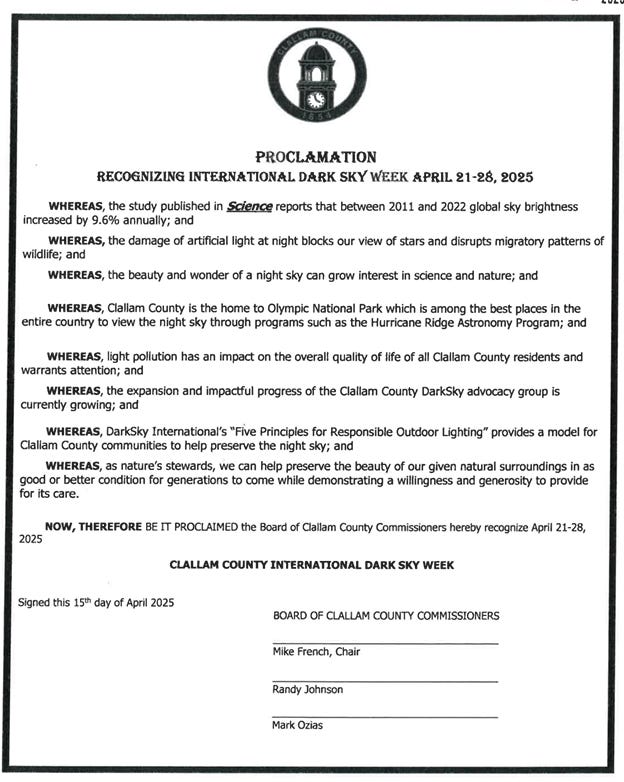
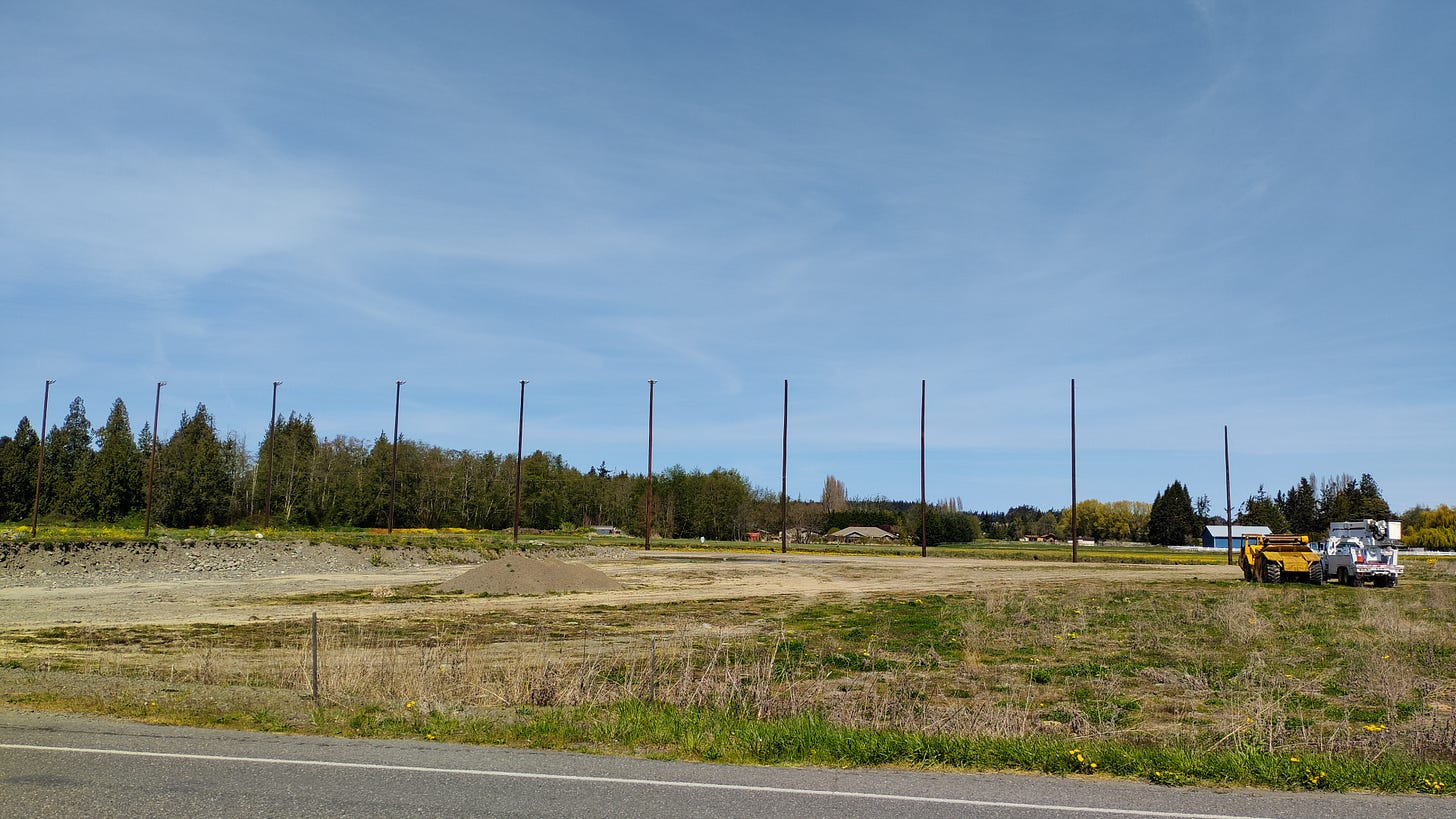
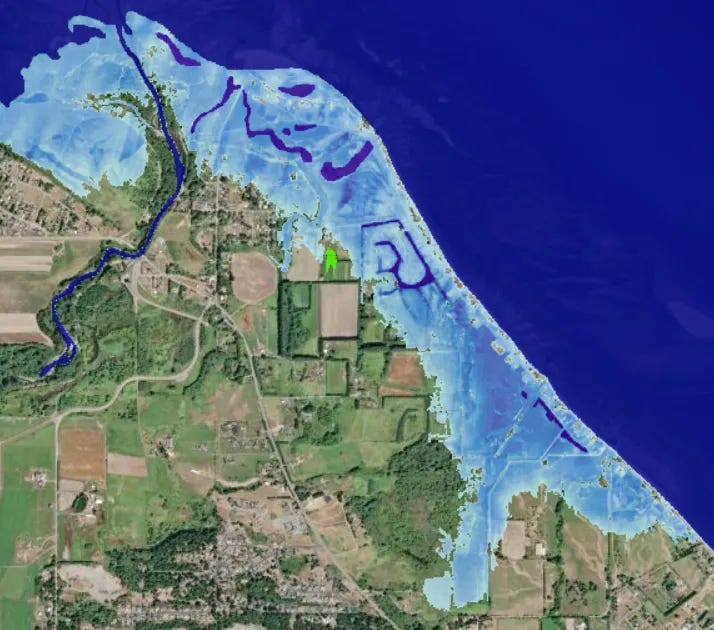
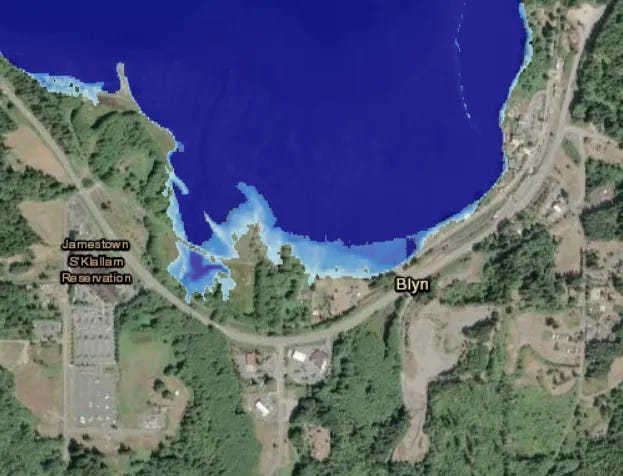
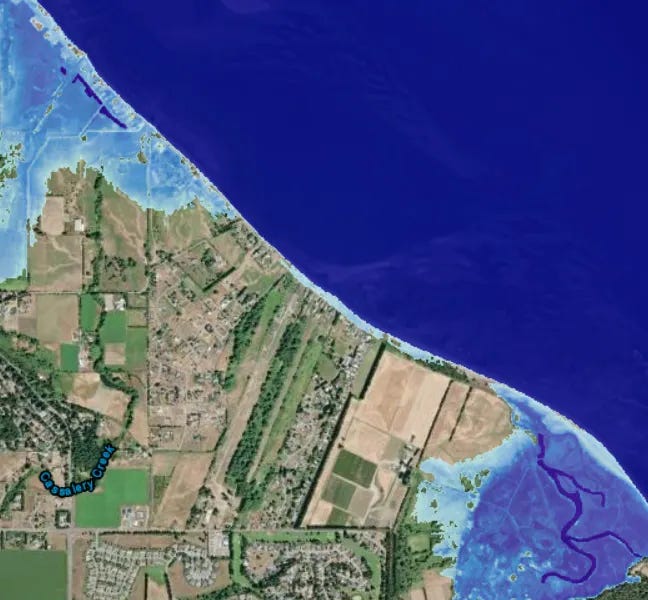
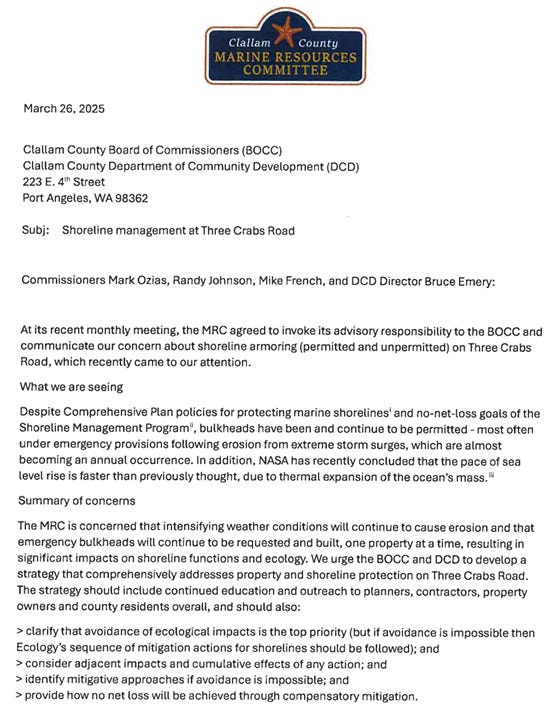
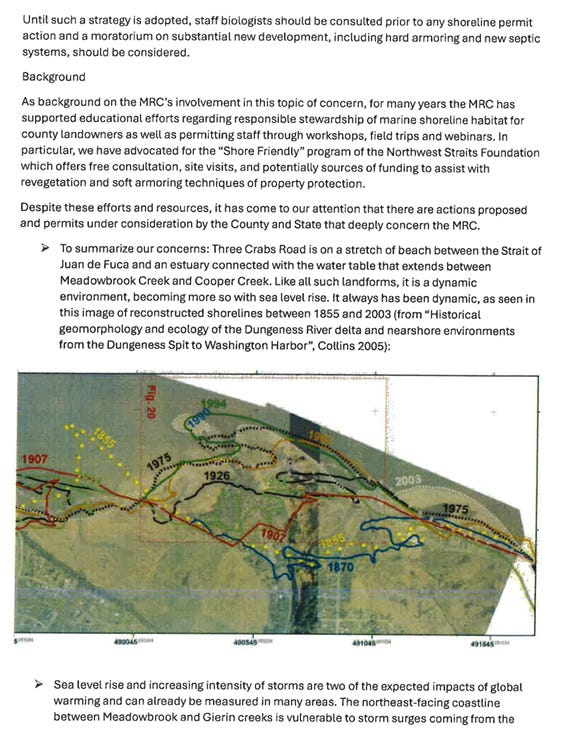
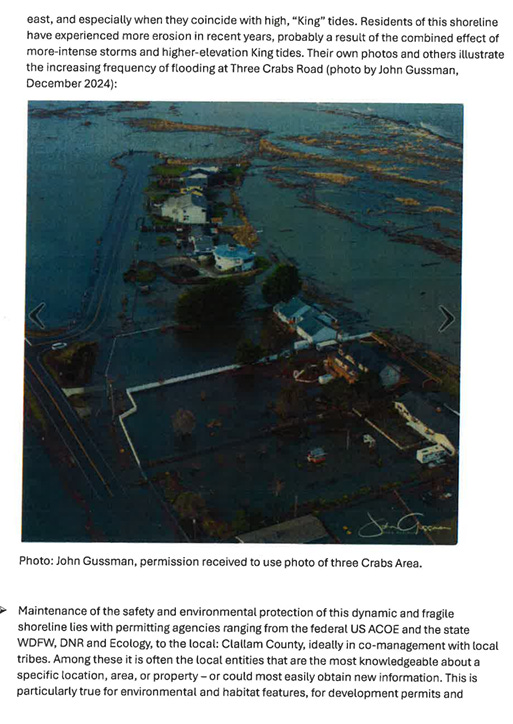
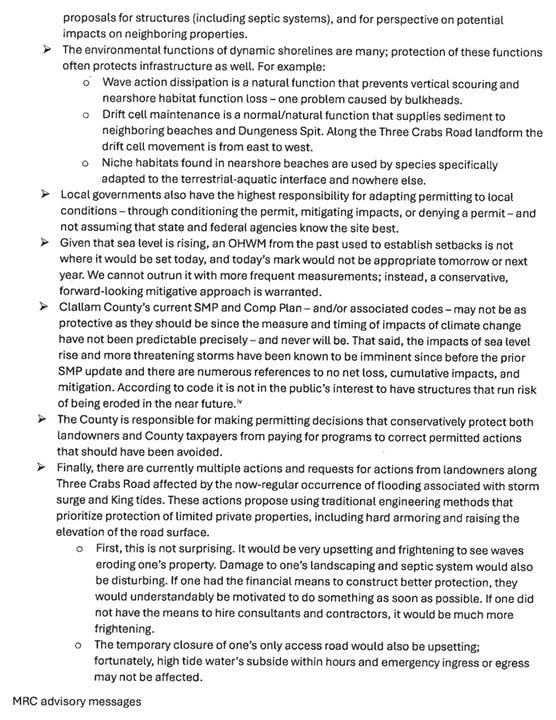
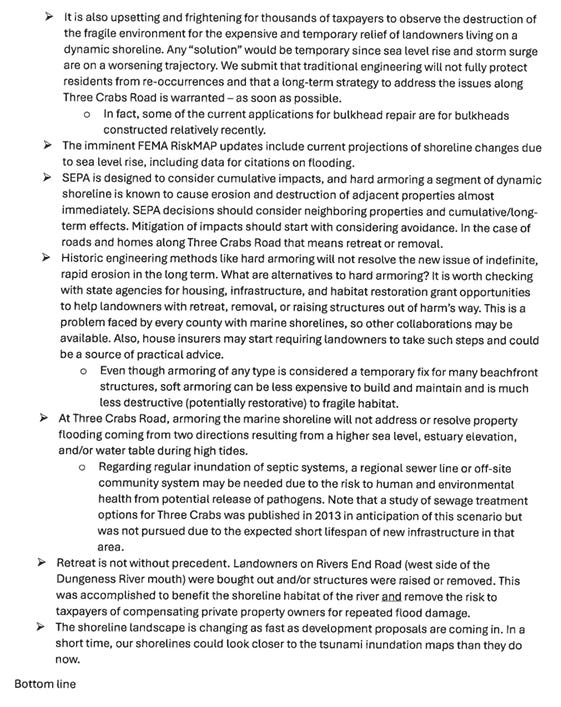
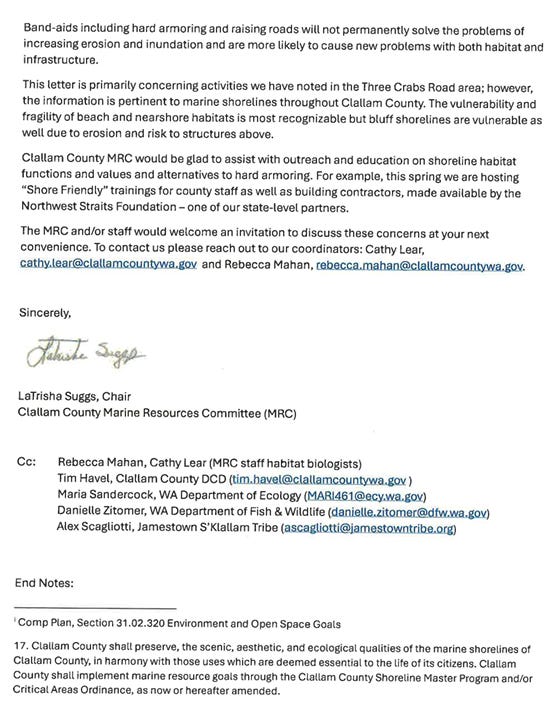
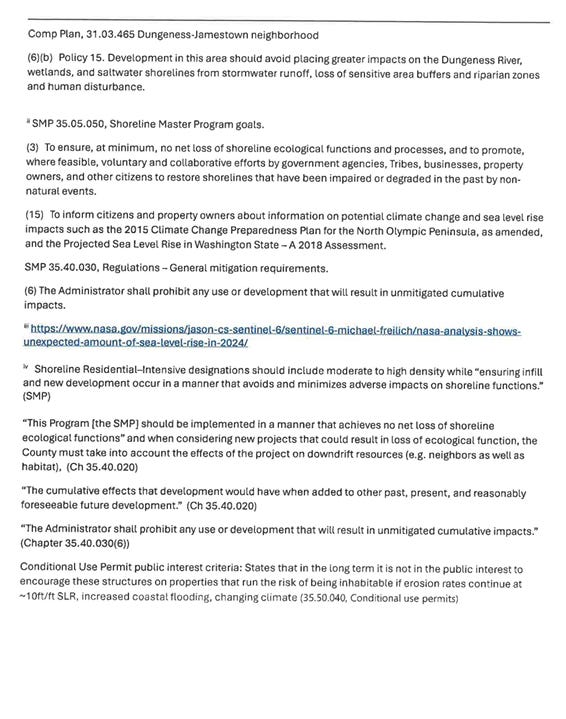
Interesting how these crises always favor the Tribe. Anyone keeping score? Thank you, Jeff, for persisting in reporting on this very important issue. It's not about buyer beware, climate change, or feel good NGOs and non-profits creating self-serving reports. It's about greed. And people will sell their souls for it. If CC wants to become the kind and serene place it once was just a few years ago, then good people need to stand up for their friends and neighbors. Because this could happen to you.
Increasingly a very small number of far left people run our lives.
Why not eradicate the expensive homes on Seashore Lane to the East?
Jamestown Beach Road homes?
If you're going to fire up those bulldozers, just keep rolling East and tear them all out.
We aren't taxpayers, we're guests.
Just built more casinos. More pot dispenseries.
There goes a pretty hefty RE Tax payment along those miles of beach.
No problem, just send Ozias to D.C. to beg for replacement dollars. After all, he and his ilk were "protecting the environment".